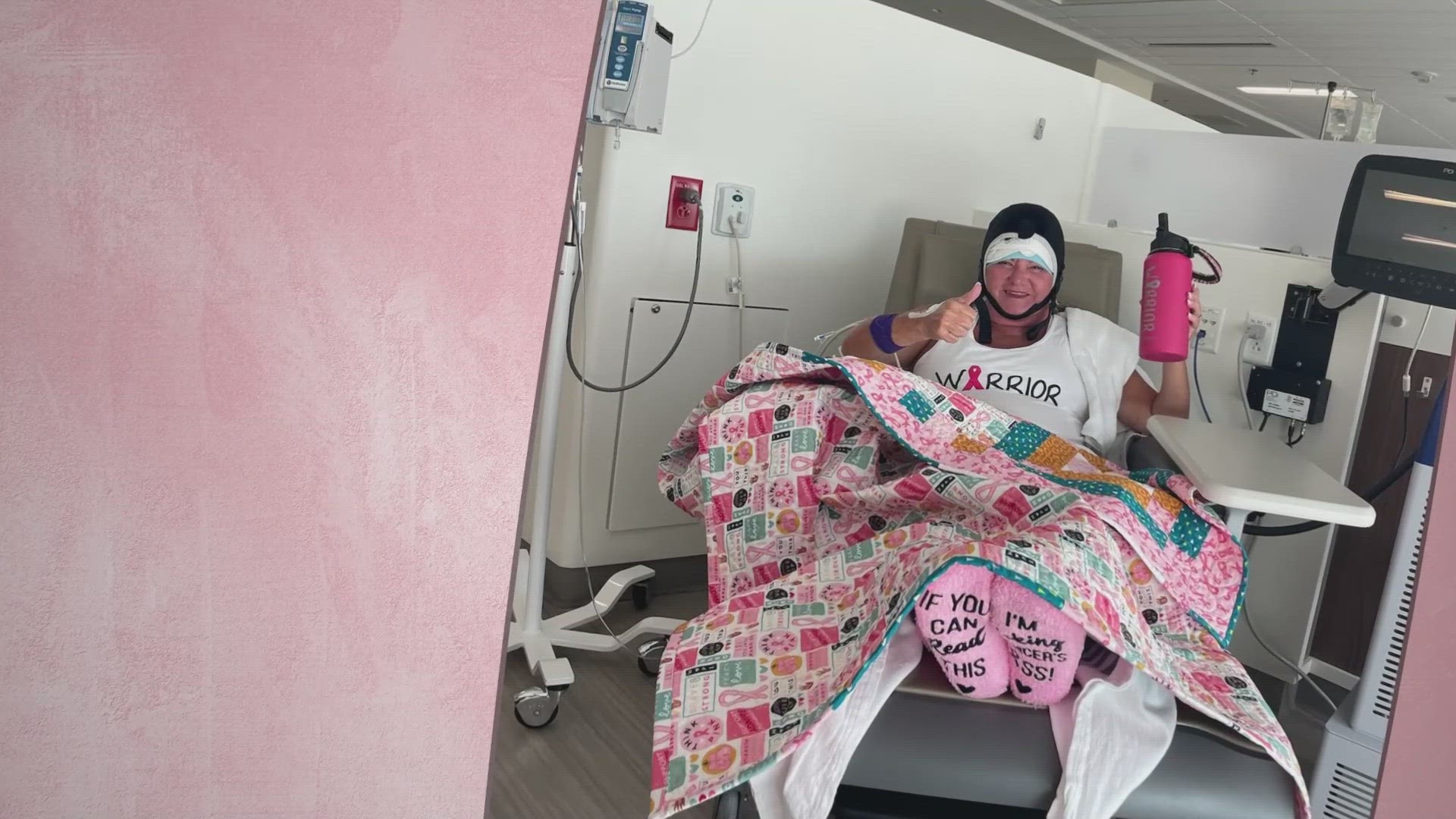JACKSONVILLE, Fla. — Aside from skin cancer, breast cancer is the most common cancer in women in the U.S. About 240,000 women will be diagnosed with breast cancer this year in the U.S. alone according to the CDC.
For First Coast News Crime and Safety Analyst Mark Baughman that statistic hits close to home. His mother, sister, and sister-in-law all had breast cancer. And a few months ago, his wife, Cathy Baughman, was diagnosed. Despite going through chemotherapy, she’s been able to keep the majority of her hair thanks to cold cap therapy.
“It is really cold the first thirty to forty minutes they put that solution in there, and it starts freezing on the top of your head,” Cathy Baughman said. “And it's like a brain freeze on triple load.”
Cathy wears a tight-fitting cap so she doesn't lose her hair. It cools her scalp, reducing blood flow to that area so that less chemotherapy reaches the hair cells. She wears it for about five hours each time.
“About an hour and a half to get it cold and have it cold, then it's on the whole time I'm getting chemo, and then it takes another hour to let it kind of thaw out,” Cathy Baughman said.
She was diagnosed with Stage 1 triple negative breast cancer after her annual mammogram this year detected a tumor. Following a lumpectomy, her doctor ordered five rounds of chemo and told her she was a good candidate for cold cap therapy.
“So in patients that have a diagnosis of breast cancer, I will say that most of them can, if they are receiving a chemotherapy medication that will cause hair loss, they can be candidates for it,” Oncologist Dr. Dayra Avila Lima with Baptist MD Anderson Cancer Center said.
Dr. Lima says the caps aren’t usually covered by insurance and don’t work for everyone.
“The efficacy is about 65 to 66%, and it also has to do with the type of hair that some patients have because the cap has to be very close to the scalp,” Dr. Lima said. “So, if someone has a lot of volume in their hair, it may be that the cooling effect on the scalp will not be as effective.”
But Cathy was willing to give it a try.
“You know less than $1,500 and I am supposed to be able to keep 60% of my hair,” Cathy Baughman said.
While she's noticed some hair loss, she's pleased with the results so far.
“Most definitely. I have a friend at church. She had the exact same chemo that I did. I don't know if hers was stronger or whatever. But she lost all of her hair within three days after her first treatment and after my first two treatments I hadn't lost any. So, it's just been recently I've lost a little,” Cathy Baughman said.
Hair loss is often one of the top concerns of chemotherapy patients. Mark Baughman, who has been by his wife's side every step of the way, says the cold cap has definitely helped in her breast cancer journey.
“I think psychologically, it really impacts how you feel. And now when we go somewhere, I think she's got a better outlook too. And I can't tell you how many people have come up to her and said to her, I can't believe you're having chemo treatments. You're looking so good,” Mark Baughman said.
“The fact that they can maintain a sense of normal in their lives during this difficult part of their lives I think it's very important, not only physically but emotionally, so I do recommend it for our patients,” Dr. Lima said.
Because her cancer was diagnosed early, Cathy's prognosis is excellent.
“You know, I'm only 60. I got a brand-new grandbaby. You know, that's all I want to do is make sure that I'm alive to hang out with my husband and my kids and my grandbaby.”
If you have breast cancer and are interested in cold cap therapy but can’t afford it, there are organizations that may be able to help cover the cost. The Rita Foundation helps fund the therapy for moms with young children being treated at Baptist MD Anderson Cancer Center. Talk to your doctor to see if you qualify.

